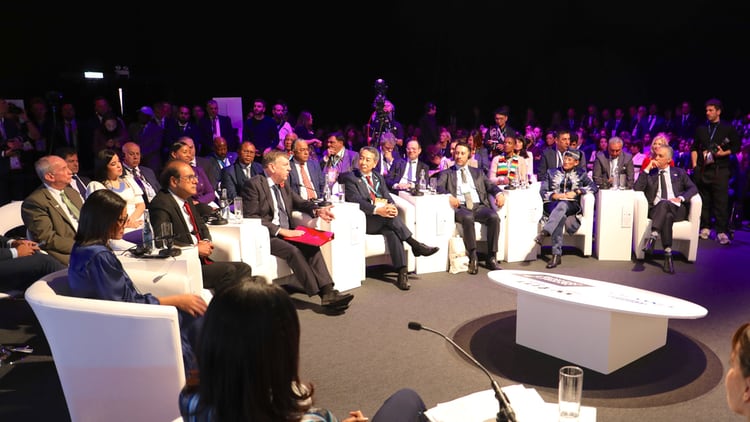The Diplomat
UNWTO celebrated the biggest Ministers Summit on record as it brought tourism leaders together on the opening day of the World Travel Market in London to focus on education and skills development.
Welcoming a record 40 Ministers of Tourism, representing every global region and destinations of all sizes, UNWTO Executive Director Natalia Bayona underscored the vital importance of investing in education.
The Summit, hosted at WTM for the 17th time, also featured inputs from key private sector players and from co-organizer the World Travel and Tourism Council (WTTC).
According to UNWTO with 1.2 billion people worldwide aged between 15 to 24, tourism can establish itself as a top employer of youth and driver of youth empowerment. However., according to the Office for Economic Cooperation and Development (OECD) around 10% of that demographic are unemployed and 14% hold only basic qualifications.
Outlining how UNWTO is leading the way in promoting tourism education, Executive Director Bayona emphasised the need to support education and skills development at every stage.
- UNWTO launched its Education Toolkit in October 2023. The landmark resource will enable countries everywhere to introduce tourism as a high school subject.
- The Bachelors Degree in Sustainable Tourism Management offered by UNWTO and the Lucerne University of Applied Sciences and Arts will welcome its first students in 2024.
- Currently, 30 universities worldwide contribute content to the UNWTO Online Academy. And on the ground, the Riyadh School of Hospitality and Tourism in Saudi Arabia and the Tourism Academy in Samarkand, Uzbekistan, train thousands of tourism professionals.
The United Kingdom’s Minister for Tourism, Sir John Whittingdale, stressed the importance of platforms like the Ministers Summit to provide a dialogue on how different countries are tackling common challenges, including advancing tourism education. With more than double the number of Ministerial-level participants than 2022 highlighting the strong interest in the topic, participants shared their insights on the place of education in the future of tourism.
- The Ministers of South Africa, Egypt, the Philippines and Jordan all made clear the importance of supporting education at every stage. For example, South Africa has launched a tourism equity fund to bridge the gap between student skills and employer needs, and in the Philippines , tourism education extends from high school to vocational degrees. At the same time, Jordan is working to boost the abilities of tourism workers, including in language skills.
- The Ministers from Mauritius, Malta and Indonesia stressed the vital need to upskill new and existing tourism workers. Mauritius noted that all Least Developed Countries were hit hard by the pandemic and face a challenge to boost literacy and numeracy rates, potentially with bilateral and multilateral support. For Malta, a new Skills Card will aim to elevate professional standards in the sector for better career prospects for workers and service for tourists, while Indonesia will prioritise innovation and adaptation as it creates 5 million tourism jobs in the next decade.
- Highlighting the vital importance of education for tourism sustainability, the Minister for Colombia outlined how the sector is bringing peace, jobs and youth opportunity to areas afflicted by insecurity, while Ethiopia shared its work investing in young people as well as in tourism infrastructure.
Alongside the Ministerial voices, the private sector was represented by leaders from Riyadh Air and JTB (Japan Tourism Bureau) Corp. They echoed the Ministers’ focus on the importance of public-private partnerships, stressing that governments need to work with businesses to ensure training meets the needs of employers.
On the back of the expert inputs from tourism leaders from every global region, Ministers were able to take away key lessons from the London Summit. Chief among them was the shared nature of the challenges facing destinations everywhere, with a common need for more and better-skilled workers.
Concluding, UNWTO Executive Director Natalia Bayona noted the urgent need to make tourism an aspirational sector for young people everywhere, with public-private partnerships essentially for bringing the current skills gap in the sector.







